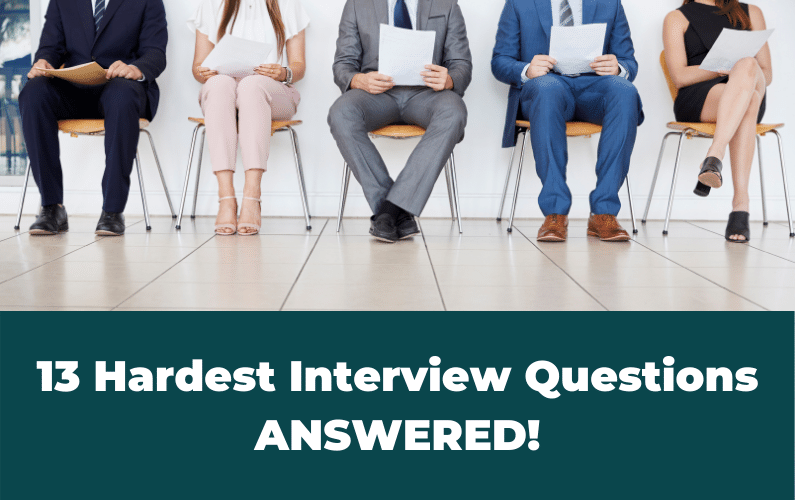Job interviews used to seriously freak me out.
It’s funny to think about it now, but I used to absolutely dread job interviews. Honestly, I probably would have rather gotten the plague than subject myself to a job interview.
That might be a little dramatic, but it’s true. I was frustrated that all my prep work didn’t seem to do me any good when I got in the room. The interviewer would ask me one of the below questions, and I’d get tripped up. I had NO idea how to respond.
My problem?
I didn’t understand why the interviewer was asking me these questions!
- Why Interviewers Ask Tough Questions in a Job Interview
- 1. Tell me about yourself.
- 2. Tell me about a time you overcame an obstacle.
- 3. How do you handle stressful situations?
- 4. What are your biggest weaknesses?
- 5. What are your biggest strengths?
- 6. What are your long-term career goals? (AKA the dreaded “where do you see yourself in 5 years” question!)
- 7. What would your previous boss or co-workers say about you?
- 8. Why did you leave your last position?
- 9. Why do you want this job?
- 10. Why do you want to work for this company?
- 11. Why should we hire you?
- 12. What are your compensation (or wage) expectations?
- 13. Why is there a gap in your employment history?
- Final Thoughts Tough Job Interview Questions
Why Interviewers Ask Tough Questions in a Job Interview
Understanding why is a game-changer. Seriously.
I always thought that interviewers were putting me through the wringer on purpose, that they were purposely trying to trip me up; I thought they wanted me to fail.
What a load of… well, you know what.
In truth, interviewers often have a requisition to fill regardless of whether they are a recruiter at an agency or an internal hiring manager. They’re praying that you’re the right person for the job.
Let that sink in.
The real reason recruiters ask these questions is to get the answers they need to justify to their boss why they should hire you.
Most times, they aren’t looking for specific, cookie-cutter answers. They’re just looking for reasons why you’re awesome!
That takes a load off your shoulders, doesn’t it?
13 of the HARDEST Job Interview Questions and their Answers
1. Tell me about yourself.

Why you’re being asked: I don’t ask this question anymore because I find responses range from confused looks to epic monologues! Many interviewers will ask this, though, because this is supposed to ease everyone in.
Best Answer: Your answer should give a BRIEF overview of your background, your skills, and why you’re interested in this job.
An example for a recent grad: I’m a recent graduate from the HR program at ABC University. I’m a motivated self-starter looking to start my career in HR, and I believe this position could be an excellent fit for me.
An example for someone looking to advance their career: I’m an HR professional who has been working in the industry for five years. I’m a hard worker with a continuous growth mindset, and I’m currently looking to take the next step in my career.
These are just rough examples, and you can expand on these, but when you’re designing your answer, think bullet points; think highlight reel.
Why it works: The reason these short answers work is that they’re quick and informative. You cover your education, some soft skills that make you unique, and your reason for being in the room.
It’s a great icebreaker and gives the interview some momentum.
2. Tell me about a time you overcame an obstacle.
Why you’re being asked: This question lets the interviewer see how you operate under challenging circumstances. It may measure your problem-solving skills or how you’ve reacted under pressure in the past.
Best Answer: Explain the obstacle or challenge you faced, how you overcame it, and what you learned in the process.
Personal example: I had to call customers to remind them that their annual payment for their product was overdue. It was one of my first work experiences, and I was uncomfortable making these phone calls. I stopped to think why I felt so awkward and realized it was because I wasn’t sure what to say when I first got the customer on the phone. I was scared that whatever I said was going to come out wrong.
To work past this fear, I wrote down everything I needed on a piece of paper, including the phone number I was calling, the name of the person, what they owed, and a mini script of what I was going to say. This allowed me to make my calls with confidence because if I did get nervous, I could reference my “cheat sheet” and stay on track.
I learned valuable lessons through that obstacle because I figured out that pausing and understanding the problem allows me to develop practical solutions. I also learned how to manage my anxiety with unfamiliar tasks.
Why it works: This answer works because you’re showing that you can identify a problem, develop a solution, and grow from that problem both personally and professionally.
3. How do you handle stressful situations?

Why you’re being asked: You’re probably interviewing for a fast-paced, high-pressure job if you’re asked this question. The interviewer wants to know that you’re confident in your skillset and your ability to problem-solve.
Best Answer: You’re confident in your skillset and ability to problem-solve!
Example: When under stress, I always take a minute to pause and assess the situation. If I have a large task load, I plan, break it down into manageable chunks, and use checklists.
Why it works: With an answer like this, the interviewer can see that you’re able to handle whatever may arise and aren’t going to get easily flustered or frustrated.
4. What are your biggest weaknesses?
Why you’re being asked: This question has nothing to do with your weaknesses. The interviewer is gauging your self-awareness.
Best Answer: THE TRUTH.
And trust me, telling the interviewer you’re a perfectionist is a sure way to get an internal eye roll.
But you can’t just stop at the weakness. You need to include the steps you take to overcome your weakness. This question is seriously all about being self-aware and managing yourself.
Personal example: I’m terrible at saying no and delegating. I often take on too many projects, which sometimes affects the quality of my work, or I miss deadlines. Not cool.
I manage my weakness by making lists and actively referencing these lists when I’m asked to take on a new task. It helps me because I can justify why I can’t take on something else. I can also discuss delegation with whoever is asking me to take on the extra work so that they can find someone else to help or prompt me to delegate one of my other projects.
Why it works: Telling the truth in an interview is super important, and it’s pretty obvious when candidates are lying. Plus, it’s so much easier for you to think of a real weakness and a way to manage it than remember something that isn’t true.
5. What are your biggest strengths?

Why you’re being asked: This is one of those questions that is asked so that the interviewer can get to know you a bit better and have something to use to justify why you should be hired.
I’m always surprised when people are stumped on their greatest strengths in a job interview, but it happens more often than you would think!
Best Answer: Whatever you’re REALLY, REALLY good at. Usually, this is a soft skill question, so think things like organization, time management, leadership, communication, etc. Make sure whatever you say, you give specific examples.
I would also urge you to think about the job description and which of your strengths apply to the job.
Why it works: Your strengths are what make you unique. You might think that everyone says the same thing but honestly, out of the hundreds of job interviews I’ve done, I’ve never heard two people give precisely the same answer. Your strengths are like your fingerprints.
Side note: Don’t be afraid to brag a bit. You should approach this interview question with confidence (and know the difference between confidence and arrogance!)
6. What are your long-term career goals? (AKA the dreaded “where do you see yourself in 5 years” question!)
Why you’re being asked: When I’m asking this question, I want to know if you’re interested in the job and the path that it could take you on. I want to see if you’re interested in growing, just looking for a stepping stone to “the next thing,” or if you’re looking for a job where you can coast. Your motivations matter!
Best Answer: Your long-term goals are to exceed the expectations for the role and grow with the company.
Why it works: You’re including the current role in your answer and are showing that you’re interested in learning and growing but believe you can do that with the company.
For these types of job interview questions, it’s best not to get bogged down in the details. The interviewer doesn’t need a play-by-play on how you see the next five years playing out.
7. What would your previous boss or co-workers say about you?

Why you’re being asked: Again, this job interview question is about self-awareness. The interviewer is looking to see how you managed your relationships in your previous position and your ability to self-assess.
Best Answer: Stick with the areas you excelled in your last position. Think about times your boss or co-workers may have given you positive feedback.
For example: My previous boss often commented on my ability to stay organized and keep everyone on track during meetings.
Why it works: Giving solid examples like the one above provides the interviewer with some peace of mind because you’ve actually received that feedback as opposed to speculating what your boss would say and potentially “tooting your horn” a bit too much.
8. Why did you leave your last position?
Why you’re being asked: The interviewer wants to know how you left things at your last job. It’s not just about whether you left on bad terms (although that can be a major red flag, so tread carefully) but also about whether any issues you had in your previous job or company could arise in the position or company you’re interviewing for.
Best Answer: You’re thankful for the opportunities given to you by your previous (or current) employer, but there are limited (or no more) growth opportunities, and you’re looking for your next challenge.
Why it works: Because it’s a diplomatic answer! It focuses on you and does not shine a negative light on your employer. You always, ALWAYS want to make sure you don’t speak badly about your previous company, boss, or co-workers – it does not reflect well on you, regardless of the situation/circumstances.
9. Why do you want this job?
Why you’re being asked: The interviewer is trying to establish your motivation for wanting the job. They want to make sure you’re motivated to excel. Job interviews with energetic, enthusiastic candidates are the best and give me, the interviewer, plenty of confidence in recommending them.
Best Answer: Mention any tasks you’re excited about doing or skills you’re excited about using.
Example: I’m interested in this job because I can use my marketing skills in various ways, including managing social media accounts. I believe my education and passion for graphic design make me an excellent fit for this position.
Why it works: It shows that you’ve done your research, you know what the job entails, and you’re interested in the work. I highly recommend being very clear on why you want the job and making sure it has nothing to do with salary or benefits.
Side note: it is best not to discuss salary or benefits until the end of the job interview!
10. Why do you want to work for this company?

Why you’re being asked: This question is similar to the previous question. The interviewer asks because they want to know that you did your research and are serious about the job.
Best Answer: Talk about specific things that excite you about the company.
Example: I feel like ABC Company would be an excellent fit for me personally and professionally. After reviewing the website, I felt like the mission statement was in line with my values and beliefs.
Why it works: This answer shows that you’ve put thought into what it would be like to work at the company. It shows you actually care.
11. Why should we hire you?
Why you’re being asked: This is another question where the interviewer wants to hear about your strengths.
Best Answer: Reiterate all the things that make you a great candidate and include specific examples.
Example: I’m dedicated, hardworking, and interested in continuous growth. I always work hard to exceed expectations and constantly learn new things to better myself professionally.
Why it works: By reiterating your strengths, you’re showing confidence. You know what you bring to the table.
12. What are your compensation (or wage) expectations?
Why you’re being asked: This job interview question is one of the ones that seem to make people most uncomfortable. The very thought of this question makes people cringe.
I completely get it. You’re worried you’ll price yourself out of a job.
The interviewer asks to ensure that your expectations align with what the company can offer. Without this alignment, there are big problems.
Best Answer: Give an honest salary range based on your research and what you need to support yourself.
Why it works: If you research a position and know what others in the same or similar jobs are making in the market, you will feel confident that your expectations are in line.
If the company is offering lower than the market average, you can use things like benefits, vacation time, etc., to negotiate. Usually, companies that offer less money have some other perks lined up to compensate.
For more about setting salary expectations, click here.
13. Why is there a gap in your employment history?

Why you’re being asked: Significant gaps in your employment history can be a red flag and show that you’re not serious about being in the workforce. However, there are honestly more legitimate reasons for gaps than negative reasons.
Don’t be afraid of this job interview question.
Best Answer: Whatever the reason, be as open and honest as possible.
Stay-at-home mom example: I took time off to raise my children and manage my household. My children are now in school, and I’m ready to re-enter the workforce.
Mental health example: I took time off to deal with a personal illness and have since recovered. I am ready to re-enter the workforce.
Why it works: These answers work because you’re addressing the gap, easing the interviewer’s concerns, and making it very clear that you’re ready to re-enter the workforce.
Final Thoughts Tough Job Interview Questions
Job interviews are intimidating, especially when you feel there is a lot at stake. The good news is that you can prepare yourself for the tough questions and respond with the best answers!
The best answers to the hardest job interview questions are:
- Honest
- Well thought out and thoroughly researched
- On message and inline with the job described in the posting
Think about questions you might be asked in your job interview and what you want the interviewer to know about you by the end of it.
Did this post help you? Give it a share!
What questions do you struggle with in job interviews? Let me know in the comments!

